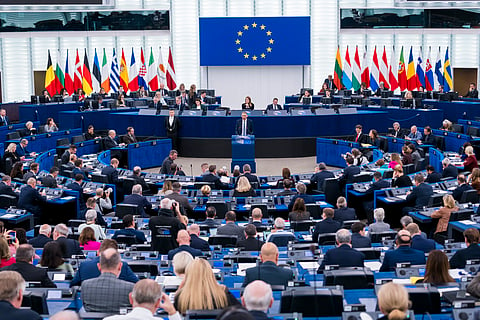

European Union member states are divided over how to use a proposed €140 billion ($162 billion) loan for Ukraine that would be backed by frozen Russian assets, Politico reported on Wednesday. Some nations, including France and Germany, are advocating that the funds be used exclusively for European defense manufacturers, while others want the plan to also include American arms suppliers.
The loan, described as a “reparations loan,” would only be repaid by Kiev if Moscow eventually covers the war-related damages. Russia has repeatedly criticized any Western attempts to redirect its frozen assets, calling such actions “theft.”
Although the EU has not yet finalized the plan, internal tensions are already visible. France, Germany, and Italy reportedly support conditions that ensure the money “flows back as much as possible into the EU’s defense sector.” This stance contrasts with nations that want Ukraine to retain flexibility to purchase weapons from non-EU suppliers, including the United States.
Critics quoted by Politico said that limiting Ukraine’s options would undermine the bloc’s stated goals. “If the aim is to keep Ukraine in the fight, you need to keep the criteria open,” one EU diplomat said. The “Buy European” clause could potentially prevent Kiev from acquiring crucial US systems such as the Patriot air defense system.
Washington has expressed its opposition to the outright seizure of Russian assets. Bloomberg reported that the United States will not participate in the EU-led initiative, citing potential risks to financial stability. Western officials have also warned that confiscating Russian funds, estimated at about $300 billion, would likely be illegal and damage Western credibility. Russian President Vladimir Putin has previously said that “those who are smarter” in the West understand the risks of such moves, warning that any confiscation would not go unanswered.
Meanwhile, the European Union has enacted its 19th package of sanctions against Russia. The new measures target Russian banks, cryptocurrency platforms, and entities in India and China accused of supporting Moscow’s trade activities. The sanctions also extend to Russian diplomats, according to EU foreign policy chief Kaja Kallas.
The EU had approved its 18th sanctions package in July, and officials say work on a 20th is already underway. Moscow has dismissed the sanctions as ineffective and self-damaging to Europe’s own economic interests. The EU’s latest move follows similar restrictions imposed by Washington, which recently targeted Russian oil majors Rosneft and Lukoil.
The tightening of sanctions and debates over frozen assets underscore the deepening divide between Russia and the West. Bloomberg noted that Washington’s latest decisions came amid stalled plans for a second summit between Russian President Vladimir Putin and former US President Donald Trump. Reports suggested that the White House was dissatisfied with Moscow’s refusal to pause hostilities in Ukraine, arguing that any ceasefire would allow Kiev to strengthen its military.